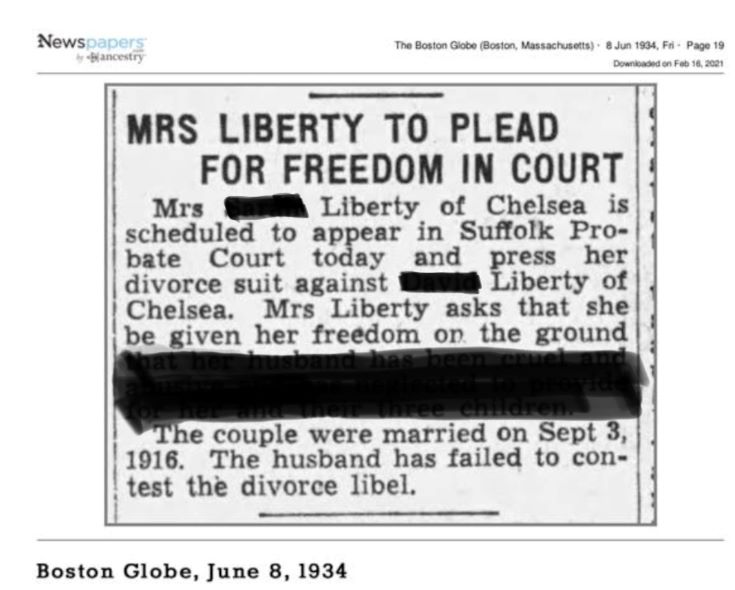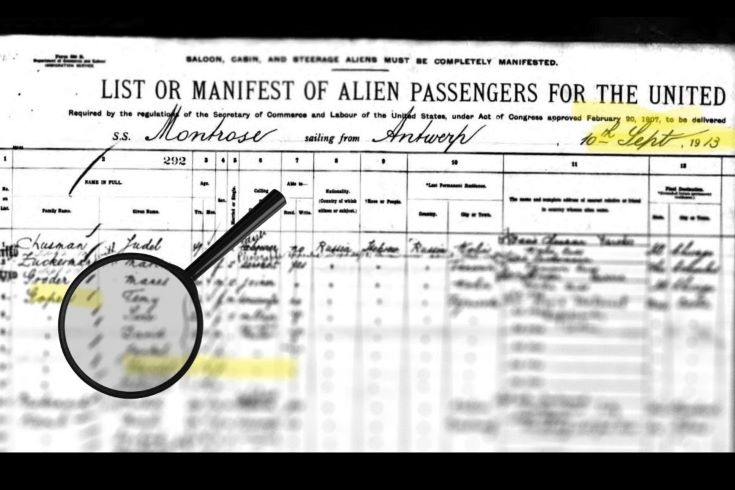Uncovering What’s Been Lost
March 22, 2022
By Terri Brown Preuss
Like Blanche Moses in 1942, the scion of one of the oldest American Jewish families in Dr. Laura Arnold Leibman's "Once We Were Slaves," the magnificently researched groundbreaking work featured in the February Sandra Seltzer Silberman HBI Conversations Series, I, too, am an obsessive amateur family genealogist. Unlike Blanche, whose goal was to preserve the grandeur and history of her family, my passion stems from the desire to uncover what's been lost to time and distance — and nothing so far shows any grandeur.
In March, I will happily mark my five-year anniversary with the Hadassah-Brandeis Institute. As I contemplate this milestone, I see a strong parallel between my passion for genealogy and my passion for the mission of HBI. Just as I was honored and humbled to discover and connect with my father's second cousin whose parents' entire families were murdered in Poland in 1942, I am also honored and humbled to spend my time and skills supporting and promoting research and programs that uncover the unrevealed lives of Jewish women around the world.
 As an amateur genealogist, I search through thousands of documents to find the next great-grandparent. As I do,& people's lives pass before my eyes, often with only the barest of details. However, here is the key: There are important facts to learn when one looks closely. From the U.S. census and immigration documents, I see a rag salesman, a grocer and a relative who tragically remained back in the old country. From the newspaper clippings, I see my beloved great-aunt asserting her right to live in peace as seen in this astounding and inappropriately tongue-in-cheek 1932 Boston Globe article, "Mrs. Liberty to Plead for Freedom in Court." And, from the survivors' testimonies at Yad Vashem: I see cousins' lives ending in despair and pain, but the testimonies shout to the world that their loved ones did in fact live.
As an amateur genealogist, I search through thousands of documents to find the next great-grandparent. As I do,& people's lives pass before my eyes, often with only the barest of details. However, here is the key: There are important facts to learn when one looks closely. From the U.S. census and immigration documents, I see a rag salesman, a grocer and a relative who tragically remained back in the old country. From the newspaper clippings, I see my beloved great-aunt asserting her right to live in peace as seen in this astounding and inappropriately tongue-in-cheek 1932 Boston Globe article, "Mrs. Liberty to Plead for Freedom in Court." And, from the survivors' testimonies at Yad Vashem: I see cousins' lives ending in despair and pain, but the testimonies shout to the world that their loved ones did in fact live.
It's much the same with Jewish history. We know the barest of details about Jewish women's lives throughout history and so we must look — and look closely — with a gender lens. This is important not only to learn about Jewish women themselves but to apply a gender lens to research reveals crucial yet unknown information. We see this in Judy Batalion's The Light of Days: The Untold Story of Women Resistance Fighters in Hitler's Ghettos," a work supported in its early stage by two HBI Awards and featured in this year's Sandra Seltzer Silberman HBI Conversations Series.
In applying a gender lens to the Jewish resistance movement in Poland in the 1930s, Batalion's "The Light of Days" revealed indispensable and previously unknown information about Jewish women's selfless and courageous actions resisting Hitler's Final Solution. While most of the women and men perished, we now know that the resistance was strong, active and well organized.
Of course, there are the exceptions — women who much has been written about, like Golda Meir. For the most part, these women are written about mainly because they are an exception. There is also the brave Hannah Senesh, who we now know from Batalion’s research and writing was given broad focus — though not undeserved — not only due to her bravery but to her beauty and acceptable place in the evolving narrative of the growth of Israel from the ashes of Europe.
 But there were others. Many others. Through HBI Research Awards given to authors, including Judy Batalion and Laura Arnold Leibman, we now know that in 1943 Renia Kukiela passed as a Polish Catholic to work as a courier, spiriting people, munitions and more to and from the supposedly sealed ghettos of Europe, and how Sarah Brandon Moses, born Christian and enslaved in the early 1800s in Barbados, applied the the era's workings of racial shift to move her family into freedom and the Jewish community for generations to come.
But there were others. Many others. Through HBI Research Awards given to authors, including Judy Batalion and Laura Arnold Leibman, we now know that in 1943 Renia Kukiela passed as a Polish Catholic to work as a courier, spiriting people, munitions and more to and from the supposedly sealed ghettos of Europe, and how Sarah Brandon Moses, born Christian and enslaved in the early 1800s in Barbados, applied the the era's workings of racial shift to move her family into freedom and the Jewish community for generations to come.
That both of these stories lead to a fuller understanding of Jewish history — and world history — exemplifies what we know to be true: That history is not completely understood and known until we apply a gender lens to our research. This is the crux of HBI, and that which I am so proud to be a part of in my role as director of the newly rededicated Sandra Seltzer Silberman HBI Conversations Series.
Whether you join us for the deeply researched history, which uncovers the lost stories of Jewish women's lives, the memoirs of Jewish women fighting for civil rights and acceptance within and without the Jewish community, or for some of the fictional Jewish women we encounter in the Silberman HBI Conversations Series, (I’m looking at you, Rabbi Vivian Green, we hope you continue to join us and support our work and the mission of HBI.
 Terri Brown Preuss is director of the Sandra Seltzer Silberman HBI Conversations Series. Join us for the next two programs in the series:
Terri Brown Preuss is director of the Sandra Seltzer Silberman HBI Conversations Series. Join us for the next two programs in the series:
Judy Heumann, “Being Heumann: An Unrepentant Memoir of a Disability Rights Activist," 7 p.m. March 23. "Being Heumann..." is the powerful story of one Jewish woman's fight to achieve respect, acceptance, and inclusion in society for herself and disabled people in the United States and later, around the world.
Marcia Falk, Night of Beginnings: A Radical Re-visioning of the Passover Seder, 7 p.m. April 11. Falk (Brandeis ’68), will read from and discus "Night of Beginnings: A Passover Haggadah," her new haggadah which returns to the roots of the festival with a full recounting of and original commentary on the Exodus story. Co-Sponsor: The Brandeis Alumni Association.